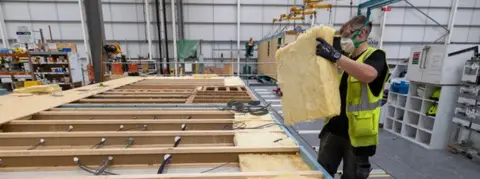Keir Starmer defends Labour U-turn on £28bn green spending
Sir Keir Starmer has insisted he had no choice but to ditch Labour's £28bn a year green investment pledge.
He defended the U-turn by claiming it was no longer affordable because the Tories had crashed the economy.
And he told the BBC Labour would still spend more than the Tories on green projects if it wins the election, and was committed to "clean power by 2030".
But Prime Minister Rishi Sunak said Labour's signature economic policy was "in tatters".
"That's what happens when you don't have a plan, and if you don't have a plan you can't deliver any change for the country."
He added that the Labour leader had "a proven track record of U-turning on major issues".
Labour's announcement represents a major scaling back of its plans to invest in green industries if it wins power, adding up around £4.7bn extra per year.
It follows weeks of confusion about the policy, which has come under growing Tory attacks ahead of the election, with Mr Sunak saying the borrowing required would force Labour to put up taxes.
The Labour leader said all the green plans announced so far by the party - including money for battery factories and "clean steel" production - would remain in place.
But grants and loans to help families to better insulate their homes will now be scaled back.
And the investment package will be part-funded by taxes on energy firms' profits, rather than entirely by more government borrowing.
The £28bn spending pledge, first announced in 2021, had already been significantly watered down by Labour.
Last June, shadow chancellor Rachel Reeves announced the spending target would only be met after 2027, instead of from the first year of a Labour government.
The party then included around £10bn a year of planned government spending in its figure, making the extra spending commitment compared to the Conservatives more like £18bn per year.
Now the party has confirmed that total extra investment compared to government plans will now be around £4.7bn per year.
It has also said it will be part-funded by keeping its higher proposed "windfall" tax on the profits of energy companies in place throughout its first term in office, if it wins power.
The party now says it hopes this will raise £10.8bn over five years to fund the plans, reducing the reliance on borrowing.
Speaking to the BBC, Sir Keir said changing the spending plans was "perfectly sensible," adding it would be "irresponsible" to ignore the economic situation.
"I can't ignore the fact the Conservatives have done huge damage to the economy," he added.
Labour has insisted the roll-back is necessary to allow the party to meet its spending rules, which say debt has to be falling as a share of the size of the economy in five years.
Speaking to the BBC, shadow chancellor Rachel Reeves said the Conservatives would be leaving a "bleak inheritance" and that she would not "make any apologies" for ensuring Labour's plans were " fully funded".
However the move to ditch the spending promise was criticised by left-wing campaign group Momentum and Unite, Labour's biggest union backer.
"This latest Starmer U-turn represents yet another capitulation to right-wing interests," a Momentum spokesperson said.
Unite leader Sharon Graham said: "The Labour movement has to stand up to the Conservatives' false accusations of fiscal irresponsibility."
Carla Denyer, co-leader of the Green Party, said: "This is a massive backward step - for the climate, for the economy and for good quality jobs."

Where does this leave Labour's plans?
 Getty Images
Getty ImagesThe consequences of Labour scaling back its green spending are hard to assess, as the party had never set out in detail where all the money would go.
It has confirmed its plan to fund grants for families to improve home insulation will now only cover five million homes over five years, instead of 19 million homes over a decade.
The funding allocated for this will be £13.2bn over five years, around double the amount currently committed by the government, but less than Labour had planned.
Pledges that remain unchanged include £1.8bn for nine "renewable-ready" ports.
Also staying is a pledge to spend £2bn on eight battery factories and £3bn on "clean" steel, figures that include assumed government spending.
A pledge to spend £500m a year on grants for companies bringing green jobs also remains - but the party has specified it won't start until 2026.
The party had never specified how much it would spend on GB Energy, the publicly-owned clean generation company it wants to set up.
It has now confirmed this will be an "initial" £8.3bn over five years, including £3.3bn for councils and community groups to become "owners of local power".
